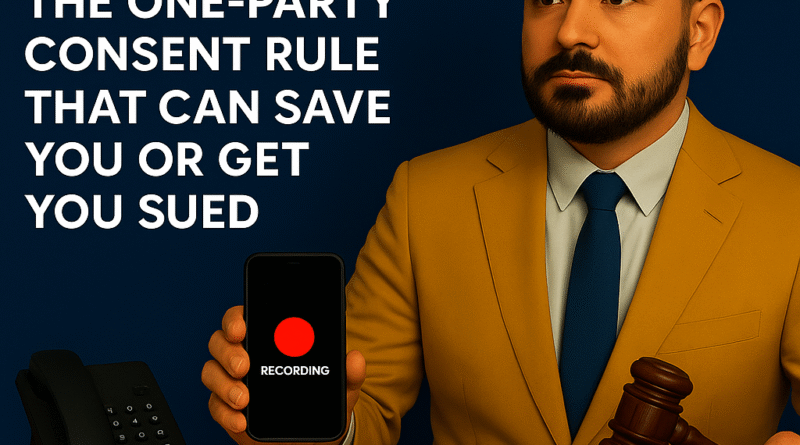Call Recording in Alabama: The One-Party Consent Rule That Can Save You or Get You Sued
Subtitle: Understand Alabama’s one-party consent rule for call recording, how it interacts with the federal Wiretap Act, and get checklists, templates, and workflows to record lawfully and avoid fines or lawsuits.
You hop on a sales or HR call and want a record for training, compliance, or dispute resolution. Can you hit “record” in Alabama without telling the other person? Usually yes—if at least one participant consents—but there are important limits, especially when out-of-state parties or “expectation of privacy” issues enter the picture. This guide translates Alabama’s one-party rule into concrete steps you can apply today.
Alabama’s baseline: one-party consent and why it matters
Alabama is a one-party consent state for recording private conversations. State law defines “eavesdrop” as overhearing, recording, amplifying, or transmitting a private communication of others without the consent of at least one person to the conversation. Recording in violation of this rule is criminal eavesdropping, a Class A misdemeanor. 0
The federal Wiretap Act (part of ECPA) generally allows recording where one party consents (again, not if done for a criminal/tortious purpose). State and federal rules align here—but interstate calls can trigger other states’ “all-party” consent laws. 2
- Phone calls (mobile/VoIP/landline)
- Private in-person conversations with a reasonable expectation of privacy
- Electronic comms (where “interception” could occur)
- Public conversations with no reasonable expectation of privacy
- Security video with no audio
- Internal notes/memos about a call (not a recording)
Visual summary only; see statute and federal law details below.
Going deeper: definitions, penalties, and multi-state pitfalls
Key definitions and penalties
- Eavesdrop: Overhear, record, amplify, or transmit a private communication of others without consent of at least one participant. 3
- Crime level: Criminal eavesdropping is a Class A misdemeanor under §13A-11-31. 4
- Federal backdrop: 18 U.S.C. §2511 permits one-party consent but bars interceptions for criminal/tortious purposes, and creates civil/criminal exposure for illegal interception, disclosure, or use. 5
Interstate and cross-border calls
When one party is in Alabama and the other is in an all-party consent state, compliance strategy becomes risk-based. Courts analyze factors like the location of the parties, place of interception, and choice-of-law clauses. A conservative approach is to collect consent from all participants when any participant may be in an all-party state. Industry references and press explain Alabama’s one-party status but caution about multi-state risk. 6
Expectation of privacy
Even in a one-party state, the definitions emphasize private communications. Conversations in public without a reasonable expectation of privacy often do not require consent; however, workplace areas (conference rooms, closed offices) typically do. 7
How to operationalize compliant call recording
Use this three-layer playbook—policy, technology, and training—to make compliance routine.
1) Policy & governance
- Written policy: State that Alabama allows one-party consent; require all-party consent for interstate calls where any participant may be in an all-party state.
- Purpose limits: Prohibit recording for any criminal or tortious purpose (mirrors federal law). 8
- Retention: Define retention periods (e.g., 18–24 months for QA; longer for regulated sectors), secure storage, and deletion workflows.
- Individual rights: Provide a simple process to request copies/deletion consistent with legal holds.
2) Technology controls
- Consent capture: IVR preamble (“This call may be recorded for quality and training; by continuing you consent”). For outbound, agents read a brief script and log consent.
- Dynamic masking: Pause recording on payment fields; auto-redact PII in transcripts.
- Access controls: Role-based access; audit logs for listen/download events; watermark exports.
- Cross-state logic: If CRM location = all-party state, force all-party prompt; block recording when consent not granted.
3) Training & supervision
- Quarterly training on scripts, escalation (if a customer objects, disable recording and continue or end call).
- Supervisors spot-check 1–2% of calls for consent capture and proper preambles.
- Before dialing: System checks contact state → if unknown, default to all-party prompt.
- Start of call: Play/recite consent preamble; if refused, disable recording and note refusal.
- During call: Pause on sensitive fields; take contemporaneous notes.
- After call: Tag recording with consent status; store with retention & access policy; run QA.
Optional: sector overlays, public settings, and media
Journalism & public spaces: Recording in public typically doesn’t require consent where there’s no reasonable expectation of privacy; however, ethical newsroom policies often seek notice anyway. 9
Regulated industries: Financial, healthcare, and insurance lines may impose additional retention, disclosure, or security rules; harmonize those with your Alabama policy.
Illustrative improvement as you move from ad-hoc scripts to full IVR/CRM automation.
Examples & quick templates
Outbound consent script (agent)
Hi, this is {Name} with {Company}. I’m in Alabama.
For quality and training, this call may be recorded. Do you consent to recording?
[If yes] Thank you. [If no] No problem—I’ll turn off recording and continue.
Inbound IVR preamble
Thanks for calling {Company}. This call may be recorded for quality and training.
By staying on the line, you consent to recording. To proceed without recording, press 2.
Cross-state safeguard
System rule: If any participant is located in an all-party consent state → require explicit consent from all parties or disable recording. Audit field: consent_all_parties = true/false.
Common mistakes to avoid
- Assuming Alabama’s rule controls every interstate call—it doesn’t.
- Recording for a retaliatory or tortious purpose (barred under federal law). 10
- Failing to document consent state/location in CRM or call-recording metadata.
- Letting agents “wing it” without a standard consent script or IVR.
- Publishing or sharing recordings internally without access controls.
- Ignoring expectation-of-privacy contexts (closed offices, HR meetings, medical details). 11
Conclusion
In Alabama, call recording is generally lawful with one party’s consent. To stay safe, build a program that: (1) captures consent reliably, (2) manages interstate calls with an all-party fallback, and (3) enforces secure access and retention. Follow the scripts and checklists above so compliance becomes routine—even when your team and customers are scattered across states.
Quick guide
- Rule: Alabama is a one-party consent state—if at least one participant consents, recording a private call is generally lawful.
- Criminal bar: Recording for a criminal or tortious purpose is prohibited under federal law (Wiretap Act).
- Interstate calls: If any participant is in an all-party consent state, get consent from everyone.
- Expectation of privacy: Private settings generally require consent; truly public conversations usually do not.
- Best practice: Use a short preamble and capture/ log consent automatically (IVR/CRM note).
- Storage: Protect recordings, limit access, and follow a written retention/destruction schedule.
- Escalation: If someone refuses, disable recording and continue (or end) the call.
FAQ
Is it legal to record a phone call in Alabama without telling the other person?
Yes, if you are a participant and you consent to the recording (one-party consent).
Do I need all parties’ consent if the other caller is in another state?
Play it safe: obtain consent from all parties if any participant may be in an all-party consent state.
What if the call is recorded for “evidence” in a dispute?
That is allowed if at least one party consents and the purpose isn’t criminal or tortious.
Are in-person conversations treated the same?
Yes for private conversations—one party’s consent is enough. Public conversations may not require consent at all.
Can my company auto-record inbound calls with an IVR message?
Yes. A preamble stating the call “may be recorded” and that continuation implies consent is a common approach.
How long should I keep the recordings?
Define retention by policy (e.g., 18–24 months for QA) and honor legal holds; delete securely when the period ends.
What penalties can apply for illegal recording?
State criminal exposure (eavesdropping) and potential federal civil/criminal remedies under the Wiretap Act.
Legal reference base
- Alabama Code § 13A-11-30/31: Definition of “eavesdrop” and criminal eavesdropping (Class A misdemeanor).
- Federal Wiretap Act (18 U.S.C. § 2511): One-party consent at federal level; bans recordings for criminal/tortious purposes; civil/criminal remedies.
- Expectation of privacy: Private vs. public setting analysis guides whether consent is needed.
- Conflict of laws: When parties are in different states, many organizations adopt an all-party consent default to reduce risk.
Final considerations
Alabama permits one-party call recording, but programs fail on the edges—interstate calls, unclear consent, and poor retention. Use preambles and agent scripts, log consent in your CRM, and enforce access/retention rules. When in doubt about a participant’s location, switch to an all-party consent workflow or disable recording.
This content is educational and not legal advice. Laws change and facts matter—consult a qualified attorney to evaluate your specific situation before recording or using any recording.
Do you have any questions about this topic?
Join our legal community. Post your question and get guidance from other members.
⚖️ ACCESS GLOBAL FORUM
